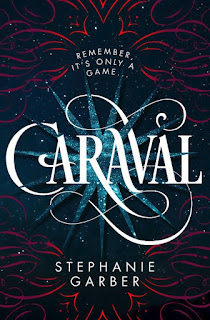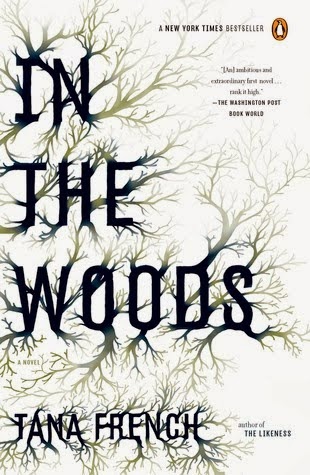Saturday, February 7, 2015
In The Woods - What's In There?
Pros: Fascinating in a strange way
Cons: Problems with main character, ending leaves a lot to be desired
The Bottom Line: If you like mysteries (or that CSI stuff), give it a try. If not, *shrug*
I know this blog is called "A Bookseller Recommends," but let's face it - it's pretty much turned into a review blog at this point. After all, I'm bound to run out of recommendable goodies at some point. So, time to review one I’m not so happy about.
When I read the blurb for Tana French’s In the Woods I was immediately intrigued. A boy found alone in the woods with his two friends missing? Four scratches cutting through the back of his shirt? His shoes filled with blood? Whoa – what happened?? And now, years later when the same boy, Adam Rob Ryan, has become a detective, a girl is killed in those same woods. Is there a connection? Could he finally remember what happened all those years ago in the woods, and will it help catch the young girl’s killer?
Hmph.
Ok, now, don’t get me wrong. Yes, I gave this book four stars because overall, that is what it deserves. French has some impressive description going on, and as a writer who struggles with good description, I give credit where it’s due, certainly.
On the same note, I enjoyed her female character, Cassie, a great deal. She had her secrets, but she was strong, smart, and knew when to pick her battles. Even though she’s dealt with some sticky situations of her own, she’s managed to keep her head on straight.
While some may find the book to be a semi-slow read, and though a few times I did get a little Monty Python “Get on with it!” impatient, as a whole, I was intrigued, stuck in the whole case with everyone else. This isn’t fast, dashing murder mystery adventure. Rather, it’s more realistic in that the detectives got stuck several times with no leads, nothing to do, and were trying to find their way through the mire of all their troubles. There was clue searching, forensic dealings with a normal time frame (none of this CSI crap), interrogations, and legal hang-ups. Murder cases don’t solve themselves overnight (most of the time anyway), and this one spans weeks. You’re not following every single cup of coffee – but you do follow them when it’s important.
Half of the book focuses on the case and its difficulties. The other half focuses on the main character, Ryan, and his problems with the case and its relations with his past, as well as his relations to his partner Cassie. This is where some of my problems begin. I can appreciate Ryan’s issues, his angst, and the ways this new case is sort of screwing with his brain. However, the way French began the book kind of threw me off. In some ways Ryan seemed a little bipolar in that the way I initially got a dark vibe from him and thought of him in that light the remainder of the book. As such, it became really weird when he joked like any other fun guy with Cassie. He joked, laughed, and acted like there were no problems in his life at all. I know, people can do that, but because as a reader I was so immersed into his thoughts all the time (which were never, ever nearly that chipper) it just seemed really weird. And the way he described himself, it didn’t seem like he was the guy that could joke. I was just thrown off a lot of the time.
My second main problem is the red herrings that French threw in there – if they were red herrings at all. At one point there was almost a Stephen King-like creature that could have been stalking the woods. There are at least three very strong incidences that point to this, and yet it is never explained nor debunked, and in the end I really wanted to know what the point of it was. Likewise, the whole previous case involving Ryan when he was a child. I ask – what was the point of it? Just to get him screwed up further? To ruin him? Show his problems? I have major, major issues with the ending because of these things. By page 300 I was getting really impatient and when page 418 rolled around I wanted at least one of three things to happen in order for me to be at least partially satisfied. None of them happened. In some ways, it’s almost like there was no resolution at all.
I’ve read that in order to have a good story, your reader needs to feel satisfied at the end. Like something has been accomplished. Nothing, to me, was accomplished save maybe one important thing, while the rest just floundered and either annoyed me greatly or bored me. I know, not all stories have happy endings and this particular book reflected life as it often tends to pan out. However, while I’m often able to accept an ending where the hero doesn’t ride off into the sunset, successful, stories that are dreary like a clouded day that reflect life at some of its low points without any oomf to the end annoy me greatly (as I’ve said). Heck, if I wanted something like this, I could watch the news.
That’s why the last star isn’t there. A not-so-great hero and a scant ending. Still, I can’t deny the meat of the rest of the book. I give this a tentative recommendation. It’s good – you just can’t expect a filling end. Just keep that in mind if you decide to read the book. That way you can’t say I didn’t warn you.
NT
Originally published on Epinions.com.
Subscribe to:
Post Comments (Atom)
Caraval by Stephanie Garber
Whoops! I completely forgot to mention this. Last month I reviewed Stephanie Garber's amazing book Caraval for the web blog I curre...

-
Yep, it's that time again. Time for a book you can get for free without lifting a finger (ok, well, you'll have to lift a few finger...
-
Pro: A creepy, crawly, excellent idea. Con: Aw man, why you gotta end it like that? The Bottom Line: After wanting to read this ...
-
My first giveaway wasn't superhot, but I attribute that to only having one book available. After all, a lot of people are burned out wit...




No comments:
Post a Comment